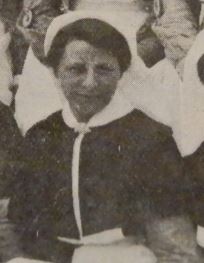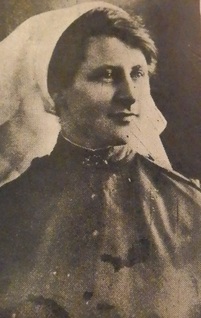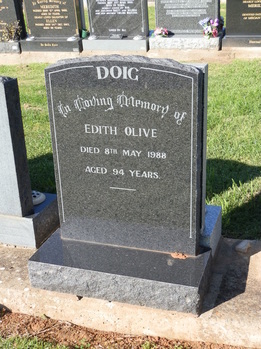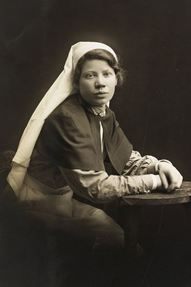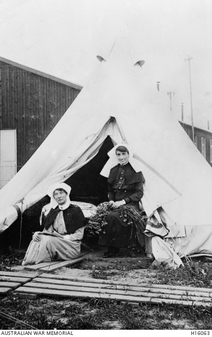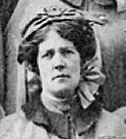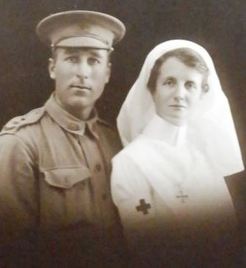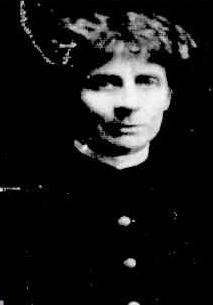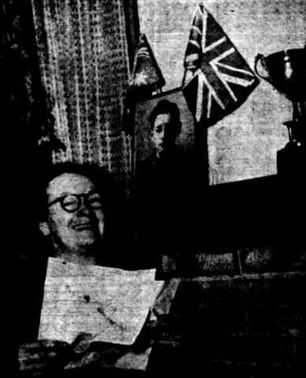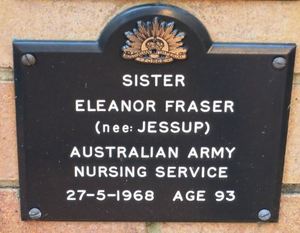Updated on VWMA
JEFFERSON, Ida Gladys
|
Staff Nurse/Sister
AANS Born 1885 at Deniliquin, NSW Daughter of Alfred Betteley JEFFERSON and Helen Gaskell nee CUSSONS Address Deniliquin, NSW Age 30 years Enlisted 22 August 1916 Embarked 22 August 1916 per “Mooltan” in Melbourne Service in India Promoted to Sister 01 July 1917 Resigned Appointment 24 July 1918 due to marriage Returned to Australia per “Mantua” 25 January 1920 Married William Thomas GRIFFITHS Died 10 July 1976 in Armadale, Vic. Aged 90 years Resided Armadale, Vic. Cremated Springvale Botanical Cemetery and remains scattered Punch Thursday 17 February 1916 page 17 |
|
Mr A. B. Jefferson has received a letter from his daughter, Ida, stating she was leaving for India shortly for hospital service under the British Government. Nurse Jefferson has been for some time past engaged at the Base Hospital, Melbourne.
The Independent Friday 25 August 1916 page 2 GRIFFITHS - JEFFERSON - On the 24th July, 1918 at St. Stephen's Church, Bandra, Bombay, Willlam Thomas, son of the late William Thomas Griffiths, London, to Ida Gladys, A.A.N.S., daughter of Alfred Betteley Jefferson, Deniliquin, New South Wales. |
JEFFREY, Olive Edith
|
Sister
AANS Born 1894 Bunbury, WA Daughter of Mr. James JEFFREY and Annie Ansell nee HAWARD Age 23 years Training Perth Public Hospital Enlisted 09 June 1917 in Perth, WA Embarked 18 June 1917 per “Mooltan” in Fremantle Service in Egypt and England Promoted to Sister 12 June 1919 Attended Physical Training Course, UK 21 July 1919 – 22 September 1919 Returned to Australia per “Konigin Luise” 18 February 1919 On Duty Appointment Terminated 07 March 1920 Married Moir Neil DOIG Died 08 May 1988 Aged 94 years Buried Centennial Park Cemetery General H Path 14 Grave 747 www.awm.gov.au P03624.001 |
JEFFREYS, Jennie Winifred
JEFFRIES, Eleanor Wibner
|
Sister
AANS Born 1882 in Derbyshire, England Daughter of Rev. William JEFFRIES and Mercy nee WIBNER Of Methodist Parsonage, Woodville, SA Occupation prior to enlistment Nursing Profession Enlisted 14 November 1914 Embarked 20 November 1914 Aged 34 years Served in France Mentioned in despatches Returned to Australia 02 November 1919 per 'Berrima' Appointment terminated 11 December 1919 Married (aged 41 years) 30 August 1923 at Methodist Church, Kent Town to Albert Arthur BRICE (aged 61 years) Died 26 October 1974 in Adelaide, SA Aged 92 years Buried Payneham Cemetery (left) www.awm.gov.au H16063 |
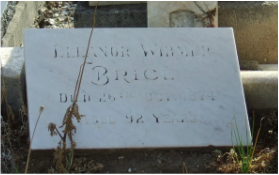
Sister Elsie Jeffries has been honoured with the Royal Red Cross amongst other Australian nurses at home. Sister Jeffries is a daughter of Rev. Wm. Jeffries, formerly Methodist minister in Warwick.
Warwick Examiner and Times Saturday 03 March 1917 page 4
TWO HONOURS IN ONE FAMILY.
Sister E. W. Jeffries, whose name appears in the above list, is the second daughter of Chaplain the Rev. William Jeffries, of the Woodville Methodist Church. The family is represented at the front by two of its members and both have now received honours in recognition of valuable services; if or Surgeon-Major L.W. Jeffries (a brother of Sister Jeffries) was last October awarded the D.S.O.Sister Jeffries was trained at the Adelaide Children's Hospital, and thence went to the Women's Hospital, Melbourne, where she took a special certificate in gynecology and midwifery, and afterwards she took a special certificate at the Hospital for Infections Diseases, Melbourne. She was on the staff of both those institutions, and later served on th staffs of Dr. Bird's private hospital and of the Launceston Public Hospital. She went with the 1st Australian Hospital from Melbourne in November, 1914, was nursing for a year in Egypt, then for eight month's on a hospital ship (in the course of which she was present at the evacuation of Gallipoli) ; and now she is senior staff sister in the 1st Australian Auxiliary Hospital at Harefield, England.
The Register Saturday 24 February 1917 page 9
Warwick Examiner and Times Saturday 03 March 1917 page 4
TWO HONOURS IN ONE FAMILY.
Sister E. W. Jeffries, whose name appears in the above list, is the second daughter of Chaplain the Rev. William Jeffries, of the Woodville Methodist Church. The family is represented at the front by two of its members and both have now received honours in recognition of valuable services; if or Surgeon-Major L.W. Jeffries (a brother of Sister Jeffries) was last October awarded the D.S.O.Sister Jeffries was trained at the Adelaide Children's Hospital, and thence went to the Women's Hospital, Melbourne, where she took a special certificate in gynecology and midwifery, and afterwards she took a special certificate at the Hospital for Infections Diseases, Melbourne. She was on the staff of both those institutions, and later served on th staffs of Dr. Bird's private hospital and of the Launceston Public Hospital. She went with the 1st Australian Hospital from Melbourne in November, 1914, was nursing for a year in Egypt, then for eight month's on a hospital ship (in the course of which she was present at the evacuation of Gallipoli) ; and now she is senior staff sister in the 1st Australian Auxiliary Hospital at Harefield, England.
The Register Saturday 24 February 1917 page 9
JENKINS, Laura Jane
Staff Nurse
AANS
2nd A G H
Born 15 October 1882 at Alberton, SA
Daughter of John JENKINS and Jane Smith nee LINDSAY
Of Queen Street, Alberton, SA
Occupation prior to enlistment Nurse
Enlisted 03 November 1915
Embarked 12 November 1915
Enlisted 21 March 1916 at Heliopolis, Cairo, Egypt
Aged 33 years
Served in France
Returned to Australia 22 January 1919 per 'Leicestershire'
Appointment terminated 24 July 1919
Died at sea 07 January 1938
AANS
2nd A G H
Born 15 October 1882 at Alberton, SA
Daughter of John JENKINS and Jane Smith nee LINDSAY
Of Queen Street, Alberton, SA
Occupation prior to enlistment Nurse
Enlisted 03 November 1915
Embarked 12 November 1915
Enlisted 21 March 1916 at Heliopolis, Cairo, Egypt
Aged 33 years
Served in France
Returned to Australia 22 January 1919 per 'Leicestershire'
Appointment terminated 24 July 1919
Died at sea 07 January 1938
Sister L. J. Jenkins
Becoming ill three weeks before her departure, Sister Laura J. Jenkins, formerly matron of Parkwynd Hospital, Wakefield street, city, died at sea on January 7 while returning to Australia, after a holiday visit to Britain.
Sister Jenkins was trained at the Adelaide Children's Hospital, and after competing her course remained there as a staff sister. In 1915 she enlisted as an army sister, and served in Egypt and France. Returning to Adelaide in 1919, she Joined the staff at Keswick Hospital, and after several months there joined the staff at Parkwynd as a theatre sister. She took charge of the hospital from Sister J. Sinclair in 1932. Sister Jenkins was the second daughter of Mr. and the late Mrs. J Jenkins, of Alberton.
The Chronicle Thursday 27 January 1938 page 18
Becoming ill three weeks before her departure, Sister Laura J. Jenkins, formerly matron of Parkwynd Hospital, Wakefield street, city, died at sea on January 7 while returning to Australia, after a holiday visit to Britain.
Sister Jenkins was trained at the Adelaide Children's Hospital, and after competing her course remained there as a staff sister. In 1915 she enlisted as an army sister, and served in Egypt and France. Returning to Adelaide in 1919, she Joined the staff at Keswick Hospital, and after several months there joined the staff at Parkwynd as a theatre sister. She took charge of the hospital from Sister J. Sinclair in 1932. Sister Jenkins was the second daughter of Mr. and the late Mrs. J Jenkins, of Alberton.
The Chronicle Thursday 27 January 1938 page 18
JENKINS, Violet Grace
|
Sister
AANS Born 1882 in Premeydena, Tasmania Daughter to Mr. Thomas White JENKINS and Susan Catherine nee MIDWOOD Age 33 years Enlisted 14 July 1915 at Austin’s Ferry, Tas Embarked 26 November 1917 Transport duty from England to Australia Ships “Demosthenes” “Wandilla” Returned to Australia “Suevic” on transport duty Service in England between transports Re-enlisted 25 October 1917 Embarked in Melbourne per “Indarra” Service in India Promoted to Sister 01 May 1918 Returned to Australia 28 February 1919 per “City of Cairo” On Duty Appointment Terminated 04 June 1919 |
JENKINSON nee PITCHER, Alice Catherine
|
Sister
Indian Service Born 11 February 1884 in Medindie, SA Daughter of John Garlick PITCHER and Mary nee BULTER Listed on the Unley WWI Honour Roll Board Mrs. A.C. JENKINSON appointed as Matron at Minda Home Incorporated in 1936. Listed in Nursing in South Australia First Hundred Years page 232 as South Australian Nursed who enlisted in Other states or in England, and served in Hospitals Overseas or on Transports. |
Charles Frederick JENKINSON married Alice Catherine PITCHER (29) on 01 January 1914 - he enlisted in the AIF (1076) 26 October 1914 occupation Late Health Inspector of 'Tandanya', Davenport Terrace, Wayville, SA
Nurse Pitcher was on the Local Board of Health in 1908
Family of one son
Died 23 February 1966 at Unley Private Hospital, Malvern
Cause of death Bilateral Lobar Pneumonia
Resided at Leahurst Aged Home for Nurses, Magill
Aged 82 years
Buried Centennial Park Cemetery West Gardens RB W22 35
Pictured with husband Charles
State Records of SA GRG 26/5/4/998
BACK FROM EGYPT.
A CHAT WITH SISTER A. C. JENKINSON.
By 'Cousin Kate.'
On August 24 the Hororata reached Melbourne with the second contingent of returned wounded soldiers. The charge nurse on the boat was Sister A. C. Jenkinson, who in December went from Adelaide to Egypt under engagement to the Indian Government. Sister Jenkinson was the sister in charge of E section of the surgical division. No. 5 Indian General Hospital at St. Stefano, Alexandria, and she has much to relate that may be of interest to readers of 'The Mail.' ''Where was your hospital situated?' I asked. 'Right at t'le wharf at Alexandria, so as to be on the spot when the wounded were landed. In our hospital we had 250 of the first men who returned from Gallipoli. and of these 209 were in my section." "It is the organisation of the hospital all that could be desired?''It is wonderfully organised, and it is an interesting fact that at 24 hours' notice it was converted from an Oriental into a European hospital. This meant, of course, that everything had to be altered— food supply and utensils, bedding, and the like. The Indians, who were for the most part convalescent, were removed to tents. ''What was your general impression as to the wounded soldiers?' "They showed marvellous fortitude at
all times, and what struck me most was the spirit of self-sacrifice. If one man saw that his neighbour was suffering more than he, he begged the nurses to attend to him first. This leads me to think that whilst, when fighting the enemy, all that is worst in a man is roused, when he is wounded and in hospital the best and tenderest feelings, come to the surface. Major McCarrison, in a letter to me. said,. 'I shall always consider it a high privilege to have the opportunity to minister to these men from Australia, who were wounded in the Dardanelles.' "Was there much Red Cross work done by the women of Alexandria?'' "Yes indeed, they were splendid and one only had to make a suggestion for it to be carried out — it seemed as though they could not do too much.'''What about letters from home? Are the arrangements for their delivery good ?''Well,' said Sister Jenkinson, 'this is a matter which calls for improvement. For some reason unknown, the mails are kept back at headquarters, and some of the poor chaps become desperate. One man had not had a letter from home since February 4, although he was positive his people had written to him every week. To try in some small way to cheer the disappointed ones, the more fortunate soldiers share their home letters with them. Queensland and New Zealand are sending a man with postal experience to take charge of the mails at headquarters, and it would be a good thing if South Australia would do the same. It is quite pathetic to see the disappointment of the convalescent soldiers, when they go down to the wharf to meet the pinnaces coming from Lemnos. From a distance the bundles in the boats look like mailbags, but when, as they draw rearer, it is seen that bread is the only freight. The men are most despondent. ''Did you see anything of the Gurkhas?'' Oh yes they are fine fellows and they have great respect for the Australians. They think his word is law and, as a high compliment, call our own Tommies' the white Ghurkas.' The best of feeling prevails amongst them, and you will see a Gurkha handing an Australian a lump of betel nut in exchange for cigarettes. ''Do they speak English at all?'' 'Very little, and we had to learn Hindustani in order that we might understand them more thoroughly. At first the hospital orderlies were ail Indians, but when we called for volunteers for this work several men from the Light Horse Regiments offered their service, and they were as gentle and tender as women.''I must speak of the wonderful work done by the stretcher bearers.' went on Sister. 'They displayed the greatest gallantry and saved hundreds of lives at the risk of their own. One officer told me that every one of them deserved the Victoria Cross. As a rule six men are attached a to each stretcher but often and often, when they were shot down, three brave fellows would go on with the work unflinchingly.'' 'Did you go out of Alexandria at all. 'Yes, I was one of those who volunteered to take the wounded by train from Alexandria to Cairo, and we spent two nights travelling thus.' ''Your husband Cpl. C.F. Jenkinson, is on active service, is he not?' 'Yes: be is in charge of the water supply from Alexandria. 'He sees to the testing and distribution of it and he is also studying ways and means of combating the fly nuisance. He is attached to the 4th Field Ambulance, Army Medical Corps.''''Have you any suggestions to make with regard to the garments sent out by the Red Cross workers?' ''Yet, I should like to say that it would be a boon if all socks could be made bigger in the leg and also if tapes instead of buttons could be sewn on pyjamas it would be a good thing. Sometimes a man has to have his pyjama coat put on back to front, and he suffers torture if a button prods him in the back. Air cushions, hot water bags, and other rubber goods are greatly needed, also mosquito nets — which should not be white, but green or khaki — and stationery.' Sister Jenkinson has brought back with her some empty shrapnel cases, both of the percussion and time variety, and these will shortly be exhibited in the city.
The Mail Saturday 04 September 1915 page 11
Nurse Pitcher was on the Local Board of Health in 1908
Family of one son
Died 23 February 1966 at Unley Private Hospital, Malvern
Cause of death Bilateral Lobar Pneumonia
Resided at Leahurst Aged Home for Nurses, Magill
Aged 82 years
Buried Centennial Park Cemetery West Gardens RB W22 35
Pictured with husband Charles
State Records of SA GRG 26/5/4/998
BACK FROM EGYPT.
A CHAT WITH SISTER A. C. JENKINSON.
By 'Cousin Kate.'
On August 24 the Hororata reached Melbourne with the second contingent of returned wounded soldiers. The charge nurse on the boat was Sister A. C. Jenkinson, who in December went from Adelaide to Egypt under engagement to the Indian Government. Sister Jenkinson was the sister in charge of E section of the surgical division. No. 5 Indian General Hospital at St. Stefano, Alexandria, and she has much to relate that may be of interest to readers of 'The Mail.' ''Where was your hospital situated?' I asked. 'Right at t'le wharf at Alexandria, so as to be on the spot when the wounded were landed. In our hospital we had 250 of the first men who returned from Gallipoli. and of these 209 were in my section." "It is the organisation of the hospital all that could be desired?''It is wonderfully organised, and it is an interesting fact that at 24 hours' notice it was converted from an Oriental into a European hospital. This meant, of course, that everything had to be altered— food supply and utensils, bedding, and the like. The Indians, who were for the most part convalescent, were removed to tents. ''What was your general impression as to the wounded soldiers?' "They showed marvellous fortitude at
all times, and what struck me most was the spirit of self-sacrifice. If one man saw that his neighbour was suffering more than he, he begged the nurses to attend to him first. This leads me to think that whilst, when fighting the enemy, all that is worst in a man is roused, when he is wounded and in hospital the best and tenderest feelings, come to the surface. Major McCarrison, in a letter to me. said,. 'I shall always consider it a high privilege to have the opportunity to minister to these men from Australia, who were wounded in the Dardanelles.' "Was there much Red Cross work done by the women of Alexandria?'' "Yes indeed, they were splendid and one only had to make a suggestion for it to be carried out — it seemed as though they could not do too much.'''What about letters from home? Are the arrangements for their delivery good ?''Well,' said Sister Jenkinson, 'this is a matter which calls for improvement. For some reason unknown, the mails are kept back at headquarters, and some of the poor chaps become desperate. One man had not had a letter from home since February 4, although he was positive his people had written to him every week. To try in some small way to cheer the disappointed ones, the more fortunate soldiers share their home letters with them. Queensland and New Zealand are sending a man with postal experience to take charge of the mails at headquarters, and it would be a good thing if South Australia would do the same. It is quite pathetic to see the disappointment of the convalescent soldiers, when they go down to the wharf to meet the pinnaces coming from Lemnos. From a distance the bundles in the boats look like mailbags, but when, as they draw rearer, it is seen that bread is the only freight. The men are most despondent. ''Did you see anything of the Gurkhas?'' Oh yes they are fine fellows and they have great respect for the Australians. They think his word is law and, as a high compliment, call our own Tommies' the white Ghurkas.' The best of feeling prevails amongst them, and you will see a Gurkha handing an Australian a lump of betel nut in exchange for cigarettes. ''Do they speak English at all?'' 'Very little, and we had to learn Hindustani in order that we might understand them more thoroughly. At first the hospital orderlies were ail Indians, but when we called for volunteers for this work several men from the Light Horse Regiments offered their service, and they were as gentle and tender as women.''I must speak of the wonderful work done by the stretcher bearers.' went on Sister. 'They displayed the greatest gallantry and saved hundreds of lives at the risk of their own. One officer told me that every one of them deserved the Victoria Cross. As a rule six men are attached a to each stretcher but often and often, when they were shot down, three brave fellows would go on with the work unflinchingly.'' 'Did you go out of Alexandria at all. 'Yes, I was one of those who volunteered to take the wounded by train from Alexandria to Cairo, and we spent two nights travelling thus.' ''Your husband Cpl. C.F. Jenkinson, is on active service, is he not?' 'Yes: be is in charge of the water supply from Alexandria. 'He sees to the testing and distribution of it and he is also studying ways and means of combating the fly nuisance. He is attached to the 4th Field Ambulance, Army Medical Corps.''''Have you any suggestions to make with regard to the garments sent out by the Red Cross workers?' ''Yet, I should like to say that it would be a boon if all socks could be made bigger in the leg and also if tapes instead of buttons could be sewn on pyjamas it would be a good thing. Sometimes a man has to have his pyjama coat put on back to front, and he suffers torture if a button prods him in the back. Air cushions, hot water bags, and other rubber goods are greatly needed, also mosquito nets — which should not be white, but green or khaki — and stationery.' Sister Jenkinson has brought back with her some empty shrapnel cases, both of the percussion and time variety, and these will shortly be exhibited in the city.
The Mail Saturday 04 September 1915 page 11
JENNINGS, Mary/May Josephine
|
Sister
AANS Born 1867 in Collingwood, Vic Daughter of Joseph Gellibrand JENNINGS and Mary nee BARROWS Sister to Minnie G JENNINGS Age 46 Training Adelaide University Medical School Enlisted 17 August 1915 Embarked 24 August 1915 per “Morea” Service in England Returned to Australia 04 February 1920 per “Konigin Luise” Appointment Terminated 17 September 1920 Did not marry Died August 1957 in Vic. Buried Springvale Botanical Cemetery 27 August 1957 Grevillea Garden 1 Bed A2 Rose 24 Photograph Table Talk Thursday 16 September 1915 page 26 |
JEREMIAH, Edith/Edyth May
|
Staff Nurse
AANS Born 1893 in Mardy, South Wales Daughter of Benjamin JEREMIAH and Anne Janet nee MILLS Sister to Mrs. Rachel DAVIES Age 24 years Enlisted 13 July 1917 Embarked 31 August 1917 Service in Egypt and Salonika Contacted Influenza and Malaria October 1918 Invalided to Australia 22 December 1918 Discharged as medically unfit (Malaria) 02 May 1919 Married Private Percy William EASTON of the 21st Battalion by 1933 Died 12 August 1982 at Heidelberg, Vic. Resided Moonee Ponds, Vic. |
Following in his parents' footsteps, Private Gwilyn Easton, is now serving abroad where his mother and father played their part in the last war. Mrs. Easton, who is here seen reading a letter from her son, was a nurse, and her husband was in the 21st Battalion. Private Easton's photo is to be seen on the mantel piece. Similar photos of mothers in Tasmania who were nurses in the last war, and who now have soldier sons will be published in "The Examiner' Women s Supplement, if the photos together with particulars are sent to "The Examiner.
Examiner (Launceston) Wednesday 09 July 1941 page 3s
Examiner (Launceston) Wednesday 09 July 1941 page 3s
JESSUP, Eleanor
|
Sister
AANS Born 1875 in Brisbane, Qld Daughter of Vincent JESSUP and Margaret nee YOUNG Sister of Ernest Charles JESSUP Age 39 years Enlisted 01 September 1915 Duty with No6 AGH until embarkation Embarked 07 February 1917 in Sydney per “Wiltshire” Service in England, France and on the field Promoted to Sister 07 February 1919 Returned to Australia 23 June 1919 per “Orita” On Duty Appointment terminated 17 September 1919 Married John Henry FRASER in 1921 Died 27 May 1968 in Queensland Aged 93 years Buried Mount Thompson Memorial Gardens Columbarium 12 Section 22 |
